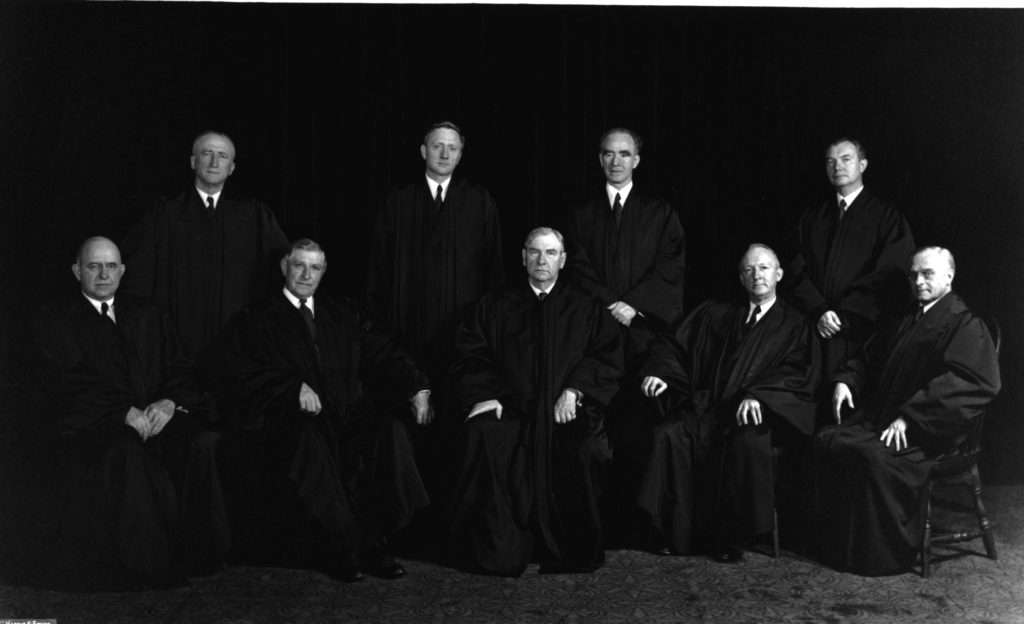The Volokh Conspiracy
Mostly law professors | Sometimes contrarian | Often libertarian | Always independent
Today in Supreme Court History: July 29, 1942
7/29/1942: Supreme Court hears oral argument in Ex Parte Quirin.

Editor's Note: We invite comments and request that they be civil and on-topic. We do not moderate or assume any responsibility for comments, which are owned by the readers who post them. Comments do not represent the views of Reason.com or Reason Foundation. We reserve the right to delete any comment for any reason at any time. Comments may only be edited within 5 minutes of posting. Report abuses.
Please to post comments


O/T
Trump memo allows federal workers to persuade coworkers their religion is ‘correct’
The Trump administration released a memo Monday that aims to protect religious expression among federal workers, outlining that employees can attempt to persuade co-workers about why their religious beliefs are “correct.”
The memo outlined conduct that should not result in disciplinary or corrective action, including displaying in the office bibles, religious artwork, jewelry, posters displaying religious messages and other indicia of religion “such as crosses, crucifixes and mezuzah.”
However, if the nonadherent requests such attempts to stop, the employee should honor the request,” the memo added.
https://thehill.com/homenews/administration/5423969-trump-memo-religious-expression/
I don't have a problem with this.
I'm on good terms with God and he/she/ze already knows who the good folks are - and who aren't.
I can see both sides. Generally I don’t disapprove of government employees displaying religious messages and symbols in their office, it’s speech about themselves (how different than wearing a cross necklace)? On the other hand what if a person displayed a Bible verse like “ye shall not suffer a witch to live” and a practicing Wiccan needs services from that office (other examples with different texts and groups can be thought of)? Luckily I think (or hope) the latter kind of thing would be pretty rare.
See also:
https://religionclause.blogspot.com/2025/07/office-of-personnel-management-says.html
A quick perusal suggests to me the whole thing is generally benign. I'm unclear what exactly changed. It seems like a symbolic move.
The memorandum notes, for instance, "During a break, an employee may engage another in polite discussion of why his faith is correct and why the non-adherent should re-think his religious beliefs. However, if the nonadherent requests such attempts to stop, the employee should honor the request."
So, offensive proselytization (certain comments found among comments on this blog come to mind) would be problematic.
There are various comments about the right to have religious materials at your workplace, which is already a given, I would think. The main thing that catches my eye is comments about co-workers trying to evangelize, including inviting co-workers to religious meetings not their own.
That sort of thing can be annoying & I'm somewhat wary about the government emphasizing it. A general comment about religious freedom in the workplace is adequate. Overall, still, the whole thing does not seem problematic.
Eight German saboteurs, two of whom were American citizens,* in June 1942 landed on American soil. They landed in two groups.
The leader of one group quickly decided to turn himself in and expose the operation. He told another member of his team (an American citizen) beforehand. These two would not be executed.
The expectation at first by the FBI and the German traitor was that this would result in a civilian trial. A Civil War-era precedent seemed to require that. It wasn't a military zone, and civilian courts were operating. The precedent would be watered down when an "enemy combatant" was involved, even an American citizen.
A major reason why a military tribunal was convened was that the saboteur operation was stopped too fast. No sabotage was committed. The result would very well be, at best, a short sentence. Also, the government didn't want to expose to the public that the FBI's heroic efforts in stopping the sabotage were exaggerated.
[See, "Military Tribunals & Presidential Power" by Louis Fisher.]
The Supreme Court review left something to be desired. Multiple justices saw themselves as part of the war effort. Their neutrality in this case was unclear. Justice Murphy recused, being a member of the military reserves. Chief Justice Stone's son was part of the defense team, though that didn't help that side much.
[See, e.g., "The Court at War: FDR, His Justices, and the World They Made" by Cliff Sloan.]
The Court quickly handed down their judgment, six of the saboteurs were executed, and THEN they had to write the opinion explaining why. That was a tricky undertaking.
The result was soon subject to significant criticism. Ultimately, in hindsight, it is far from clear if the whole thing could not have been handled by a civilian process.
As Justice Scalia later noted in his dissent in Hamdi v. Rumsfeld, "The case was not this Court’s finest hour."
==
* There was later a dispute regarding whether they lost their citizenship by joining the German army and taking part in an invasion of U.S. soil. The matter was ultimately somewhat moot since the decision also applied to U.S. citizens.
Remember when this was such a highly invoked case? It’s interesting that today almost no one recalls supporting the W Bush administration….
A crucial reason for keeping the trial secret is that we did not want to help the Nazis figure out why the mission failed and how they could improve their chances on a second attempt. Also, we did not want to let known who had betrayed the mission, lest Nazis make "training films" of his loved ones choking slowly to death on piano wire. Such films could help persuade future saboteurs of the utter folly of trusting American authorities.
(2) All that said, however, it would have been better to keep the trial as an entirely secret court-martial of wartime spies. The propagandistic semi-public trial deeply embarrassed our civilian courts for no good reason.